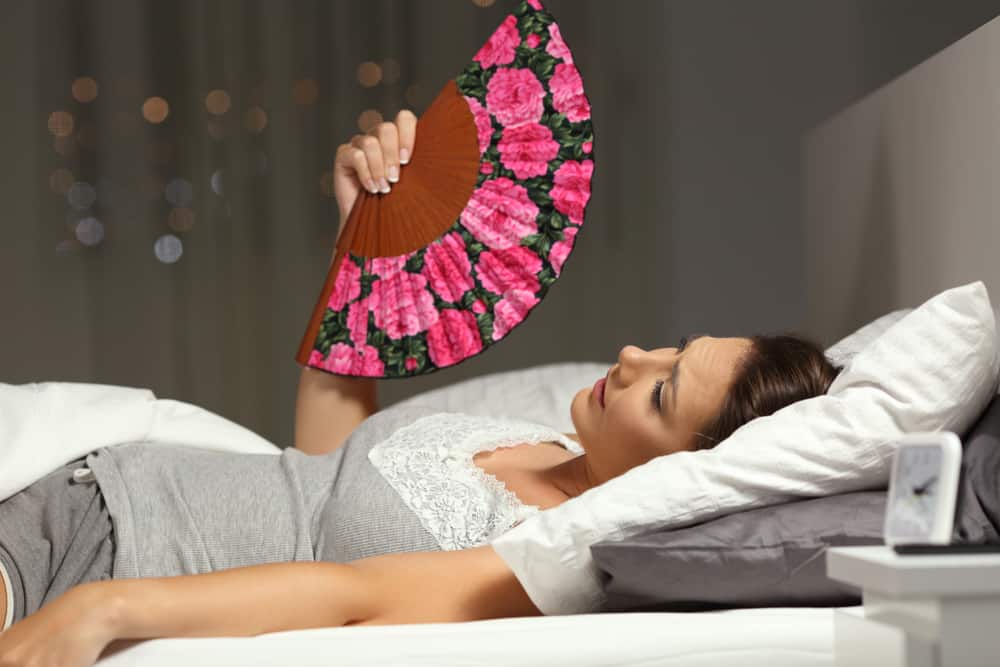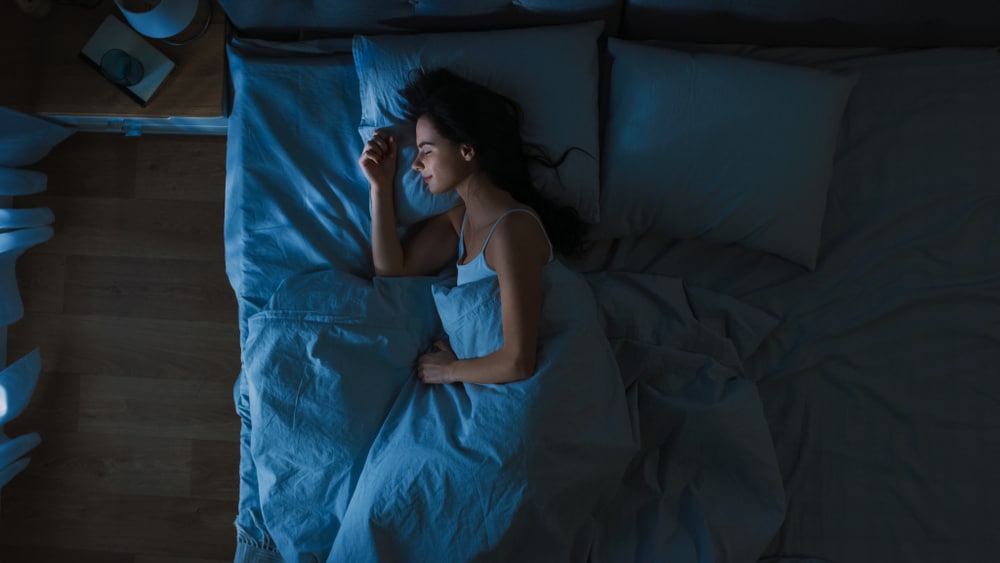Postpartum night sweats can have you waking up multiple times a night, drenched and uncomfortable. As annoying as they are, night sweats are a normal side effect of your body returning back to its pre-pregnancy state, and they’ll usually go away soon enough without requiring treatment (though there are some things you can do to make yourself more comfortable in the meantime).
In this article, we’ll go over what causes night sweats, how long you can expect to deal with them, and what you can do to relieve the discomfort caused by them.
What Causes Postpartum Night Sweats?
Postpartum night sweats are an extremely common symptom that usually appears within the first week or so of giving birth. They happen for two reasons:
First, during pregnancy, your body saw about a 40% increase in blood volume. This extra volume was produced to help support your baby. So once the baby is born, your body will reabsorb and eliminate all that excess. The majority of that extra blood is water that your body will get rid of through sweat.
The second cause of night sweats is the change in estrogen levels. Your estrogen levels were on a steady incline over the course of your pregnancy and reached their peak in the moments before giving birth. Afterward, there’s a sudden and dramatic drop in estrogen because the placenta, which was making most of the excess hormones, is gone.
That sudden drop can cause your body to go into hot flashes, just as you would in menopause when estrogen levels drop permanently. Those hot flashes can cause you to sweat.
How Long Does Postpartum Sweating Last?
This varies a lot depending on your body, but in general, postpartum symptoms including night sweats last about six weeks. That doesn’t mean the night sweating specifically will last a full six weeks. It also doesn’t mean it will persist at the same intensity for that time period.
In fact, night sweats are usually at their worst in the second and third week after giving birth. Then they’ll gradually taper off until they’re gone a few weeks later. If you’re breastfeeding, it might take an extra couple of weeks for your night sweats to subside.
Regardless, you should be sleeping cooler by the second or third month. If you’re still experiencing night sweats after that, it could be a sign of a more severe issue like postpartum depression. It’s worth touching base with your OB/GYN at this point, especially if you’re experiencing other symptoms like depression, mood swings, or difficulty bonding with your baby.
Who Is Most Likely to Get Postpartum Night Sweats?
Because night sweats are a side effect of the hormonal rebalance going on after giving birth, anybody who’s just given birth will potentially experience some night sweats. However, for some it will be so mild as to be almost unnoticeable, while others will struggle to make it through the night without waking up from the discomfort.
Where you land on that spectrum depends on a few other factors related to your pregnancy. Here are some of the factors that can make you more likely to experience more intense postpartum night sweats.
Giving Birth to Multiple Babies
If you were pregnant with twins or triplets, your blood volume increase was even higher than it would be for one baby. Your estrogen levels also rose even higher, making the drop back down to normal even more dramatic. That bigger adjustment both in hormone levels and blood volume means night sweats might be more intense.
Excess Swelling During Pregnancy
If you struggled with excess swelling and water retention while pregnant, you’re at higher risk of sweating more after birth because your body simply has more fluids to get rid of. If you’re still pregnant and looking to avoid extreme night sweats, consider cutting back on salt and drinking more water.
Breastfeeding
If you are breastfeeding your newborn, night sweats are not only more likely but also likely to last longer. That’s because breastfeeding suppresses your estrogen levels, causing them to drop even lower than they did right after birth. However, even if you are breastfeeding, the night sweats and hot flashes will gradually taper off just as they would if you weren’t breastfeeding. It just might take a little longer.
How Can I Stop Postpartum Night Sweats?

The key to dealing with night sweats is keeping yourself cool and hydrated. While there aren’t any medications or treatments to stop night sweats, managing your body temperature can help minimize the amount of sweating until your hormones rebalance.
Drink Lots of Water During the Day
Hydration is important all the time, but you need to pay extra close attention to postpartum. If you’re breastfeeding, you’re losing a lot of fluids through the milk. Combine that with the fluids lost through night sweats and you’re left with a very dehydrated body.
One of the many side effects of dehydration is poor temperature regulation. Your body needs water to keep its internal temperature stable. So, drinking lots of water to replace the fluids your losing can help keep you cooler at night, thereby minimizing the night sweats.
Keep a Pitcher of Water in the Fridge
Water at any temperature will help rehydrate you and improve your body’s ability to regulate temperature, but cold water can also provide some instant relief. Keep a pitcher of water in the fridge so that if you wake up in a sweat, you can cool off and rehydrate at the same time.
Wear Loose, Breathable Pajamas
Loose, breathable fabric—especially cotton—can really help keep your body temperature down while you sleep. Cotton is also really good for wicking away moisture so when you do sweat, it won’t stick to you and make you uncomfortable. It’ll be easier to sleep through the night sweats if you’re feeling dryer and cooler.
Turn Down the Thermostat
The best way to combat hot flashes while you sleep is to keep the temperature in the room cooler. So, put on the AC or crack open a window to let some cool air in. You can also turn on a fan to help circulate the cool air better.
This won’t stop the night sweats caused by your body’s need to eliminate excess fluid, but it will help with the temperature fluctuations, so you’ll be able to sleep through the night more comfortably.
Cool Shower
If you wake up in a sweat and find it difficult to get back to sleep, take a cool shower and change into a fresh pair of breathable pajamas. The cold water will help lower your body temperature, and the clean, dry pajamas will help you get comfortable so you can fall back to sleep.
You can also make this part of your bedtime routine. Take a quick cold shower before you go to bed at night to help lower your body temperature before bed.
Mild Exercise in the Morning
Physical exercise helps stabilize hormone levels, so adding some mild workouts to your postpartum recovery can help you get past the night sweats phase faster. These workouts don’t have to be at all rigorous. In fact, you should stick to more mild routines since you’re still recovering from the birth.
If you had an uncomplicated vaginal birth, you can start adding physical activity back to your routine within a few days. When you start exercising, follow these tips:
- Include longer warmups and cool downs.
- Avoid strenuous workouts. Instead of a run, stick to walking. Instead of kickboxing, do yoga.
- Stretch for 5-10 minutes after any exercise.
- If you feel discomfort or pain, decrease the intensity, or stop completely.
- Aim for 30-45 minutes per day.
With a newborn to take care of, it can be tough to find time for exercise. Your new workout routine can be as simple as strapping your baby into a stroller and heading out for a walk around the neighborhood.
If you had a C section or a complicated birth, talk to your doctor before starting an exercise program so you can decide when a safe time to start is and what activities are safe for you to do during recovery.
Avoid Heavy Meals Before Bed
Make your dinner something light and vegetable-based. High fat or high protein foods are a lot of work to digest so if you’re experiencing night sweats, this can make them worse. Veggies also tend to have a high water content so eating them for dinner gives you an added boost of hydration right before bed to help better regulate body temperature.
When Should I Be Concerned About Night Sweats?
For the most part, night sweats are nothing to worry about unless you’re experiencing other symptoms alongside them. Since the sweating is a normal side effect of the major hormonal shifts that are happening in your body after giving birth, they usually aren’t a major cause for concern.
However, if you’re experiencing other, more serious symptoms with the night sweats, it could be a sign that something more than hormones is at work here. As you work to manage your night sweats, keep an eye out of these other symptoms:
- Body aches and pains
- Unusual or foul vaginal discharge
- Depression or anxiety
- Dizziness or fainting
- Abdominal pain
- Severe cramping
- Pain or burning during urination
- Warm, red, or tender areas on your breasts
- Diarrhea or constipation
- Chronic cough
- Blood clots
- Excess bleeding
- High fever and chills
- Unexplained weight loss
These could all be signs of an infection or other urgent medical issue that requires your doctor’s attention.
Final Thoughts

Without any of these other symptoms, night sweats are just an annoying side effect of your body returning to its non-pregnant state. The best thing to do is use the tips above to manage them until they go away on their own.
